名词性从句
名词性从句讲解(最全版)
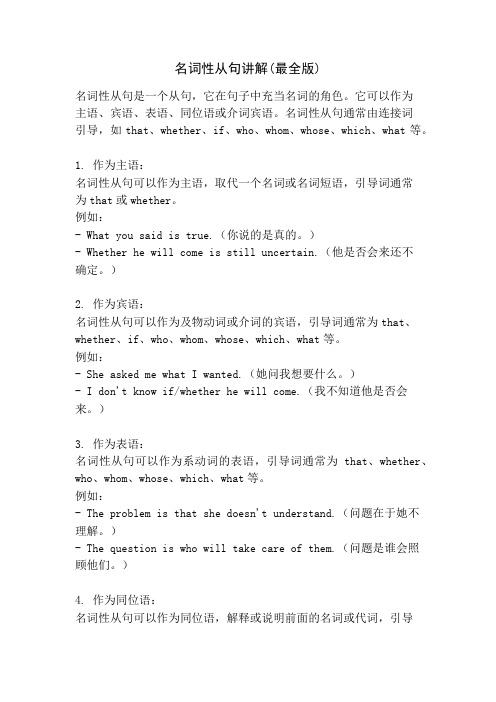
名词性从句讲解(最全版)名词性从句是一个从句,它在句子中充当名词的角色。
它可以作为主语、宾语、表语、同位语或介词宾语。
名词性从句通常由连接词引导,如that、whether、if、who、whom、whose、which、what等。
1. 作为主语:名词性从句可以作为主语,取代一个名词或名词短语,引导词通常为that或whether。
例如:- What you said is true.(你说的是真的。
)- Whether he will come is still uncertain.(他是否会来还不确定。
)2. 作为宾语:名词性从句可以作为及物动词或介词的宾语,引导词通常为that、whether、if、who、whom、whose、which、what等。
例如:- She asked me what I wanted.(她问我想要什么。
)- I don't know if/whether he will come.(我不知道他是否会来。
)3. 作为表语:名词性从句可以作为系动词的表语,引导词通常为that、whether、who、whom、whose、which、what等。
例如:- The problem is that she doesn't understand.(问题在于她不理解。
)- The question is who will take care of them.(问题是谁会照顾他们。
)4. 作为同位语:名词性从句可以作为同位语,解释或说明前面的名词或代词,引导词通常为that、whether、who、whom、whose、which、what等。
例如:- The fact that he lied surprised me.(他撒谎的事实让我感到惊讶。
)- His belief that she will succeed is unwavering.(他坚信她会成功。
名词性从句
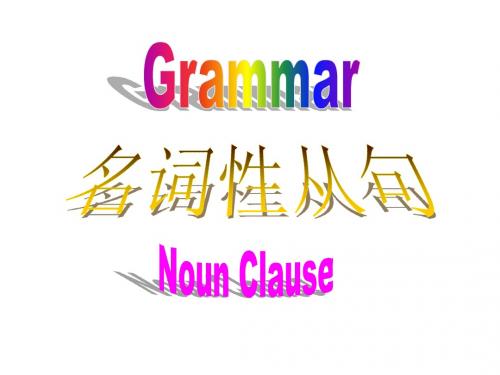
出品
三、宾语从句
在句中充当及物动词或介词宾语的句子叫做 宾语从句。 我不知道你会来这里。 I don’t know (that) you will come here.
三、宾语从句
1、用作及物动词的宾语 (1) They pretended that they were reading in the room. (2) I didn’t know what they were talking about.
以it作形式主语,把主语从句后置的常 用句型有:
1. It+be+形容词+that从句
It is/was certain that – clause
clear
important necessary probable possible
出品
(1)It is certain that she will do
出品
一、主语从句
在句中充当主语的从句叫做主语从句。 他星期三来这里是肯定的。
That he will come here on Wednesday is certain.
注意:从句作主语时,就算是句子意思完整,都 要加上从属连词that, 而且that不能省略,不充当 成分仅起连接作用。 他星期三是否来这里还不肯定。 Whether he will come here on Wednesday is not certain. 注意:主语从句表示“是否” 只用 “whether” 而不用“if”
well in her exam.
(2) It is probable that he told her everything.
www.010englBiblioteka 出品
名词性从句
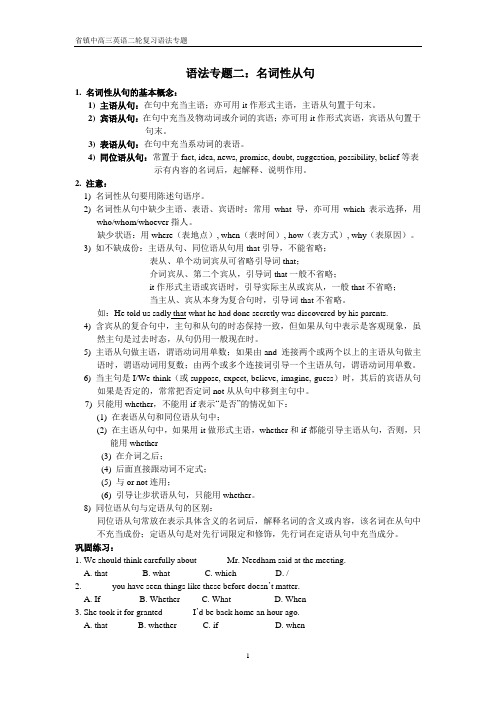
语法专题二:名词性从句1. 名词性从句的基本概念:1) 主语从句:在句中充当主语;亦可用it作形式主语,主语从句置于句末。
2) 宾语从句:在句中充当及物动词或介词的宾语;亦可用it作形式宾语,宾语从句置于句末。
3) 表语从句:在句中充当系动词的表语。
4) 同位语从句:常置于fact, idea, news, promise, doubt, suggestion, possibility, belief等表示有内容的名词后,起解释、说明作用。
2. 注意:1) 名词性从句要用陈述句语序。
2) 名词性从句中缺少主语、表语、宾语时:常用what 导,亦可用which表示选择,用who/whom/whoever指人。
缺少状语:用where(表地点), when(表时间), how(表方式), why(表原因)。
3) 如不缺成份:主语从句、同位语从句用that引导,不能省略;表从、单个动词宾从可省略引导词that;介词宾从、第二个宾从,引导词that一般不省略;it作形式主语或宾语时,引导实际主从或宾从,一般that不省略;当主从、宾从本身为复合句时,引导词that不省略。
如:He told us sadly that what he had done secretly was discovered by his parents.4) 含宾从的复合句中,主句和从句的时态保持一致,但如果从句中表示是客观现象,虽然主句是过去时态,从句仍用一般现在时。
5) 主语从句做主语,谓语动词用单数;如果由and 连接两个或两个以上的主语从句做主语时,谓语动词用复数;由两个或多个连接词引导一个主语从句,谓语动词用单数。
6) 当主句是I/We think(或suppose, expect, believe, imagine, guess)时,其后的宾语从句如果是否定的,常常把否定词not从从句中移到主句中。
7) 只能用whether,不能用if表示“是否”的情况如下:(1) 在表语从句和同位语从句中;(2) 在主语从句中,如果用it做形式主语,whether和if都能引导主语从句,否则,只能用whether(3) 在介词之后;(4) 后面直接跟动词不定式;(5) 与or not连用;(6) 引导让步状语从句,只能用whether。
名词性从句

语序:陈述语序
在句中充当主语的从句称为主语 从句。英语中主语从句的句型可分 为两大类: 直接将主语从句放在主语位置上; 用it作形式主语,将真正的主语从 句后移,放在其他成分后。
让我们先说说第一类吧!
一、连接词(只起连接作用,在从句中不充当句子成分)
that:无词义。 e.g.: 他赢得比赛一事在我国引起巨大轰动。 That he won the game made a tremendous stir in our country. whether:“是否”。可单独使用,也可与or或or not连用。 e.g.: 我们明天是否能去春游取决于天气。 Whether we can go for a spring outing depends on the weather. 他们是否会来还未告诉我们。 Whether they will come has not been told to us.
四、主语从句与主谓一致
一个从句作主语时,谓语动词通常用单数形式, 特别是用it作形式主语的句型。 e.g.: Whether this kind of chemicals is better has not been tried.
当what引导主从,应遵循意义一致原则,谓语动 词选用相应形式。表语是复数时,谓语动词用复数 形式。 e.g.: What we do willingly is easy. What they were searching for were the missing gems.
Introduction
名词性从句:包括四种:主语从句、表语从句、宾语从
句、同位语从句。
连词:引导名词性从句的连词有以下三类
连接词:只起连接作用,在从句中不充当句子成分; 连接代词:连接主从句,并在从句中作主语/宾语/表 语/定语; 连接副词:连接主从句,并在从句中作时状/地状/原 因状/方式状。
名词性从句
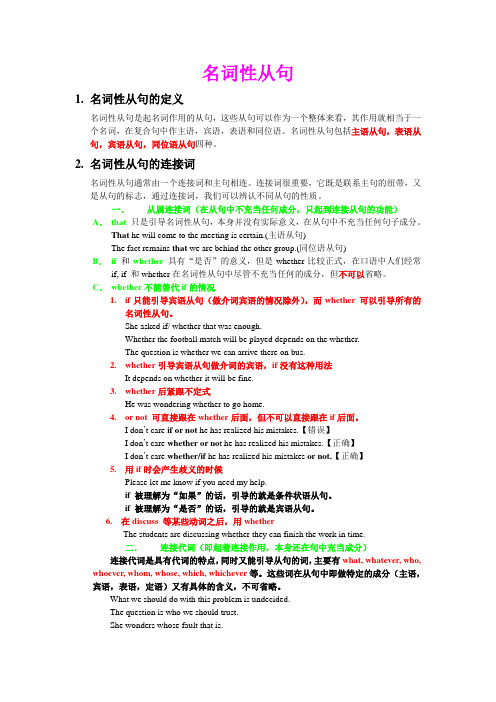
名词性从句1.名词性从句的定义名词性从句是起名词作用的从句,这些从句可以作为一个整体来看,其作用就相当于一个名词,在复合句中作主语,宾语,表语和同位语。
名词性从句包括主语从句,表语从句,宾语从句,同位语从句四种。
2.名词性从句的连接词名词性从句通常由一个连接词和主句相连。
连接词很重要,它既是联系主句的纽带,又是从句的标志,通过连接词,我们可以辨认不同从句的性质。
一.从属连接词(在从句中不充当任何成分,只起到连接从句的功能)A.that 只是引导名词性从句,本身并没有实际意义,在从句中不充当任何句子成分。
That he will come to the meeting is certain.(主语从句)The fact remains that we are behind the other group.(同位语从句)B.if和whether具有“是否”的意义,但是whether比较正式,在口语中人们经常if, if 和whether在名词性从句中尽管不充当任何的成分,但不可以省略。
C.whether不能替代if的情况1.if只能引导宾语从句(做介词宾语的情况除外),而whether 可以引导所有的名词性从句。
She asked if/ whether that was enough.Whether the football match will be played depends on the whether.The question is whether we can arrive there on bus.2.whether引导宾语从句做介词的宾语,if没有这种用法It depends on whether it will be fine.3.whether后紧跟不定式He was wondering whether to go home.4.or not 可直接跟在whether后面,但不可以直接跟在if后面。
名词性从句的三种类型及例句解析
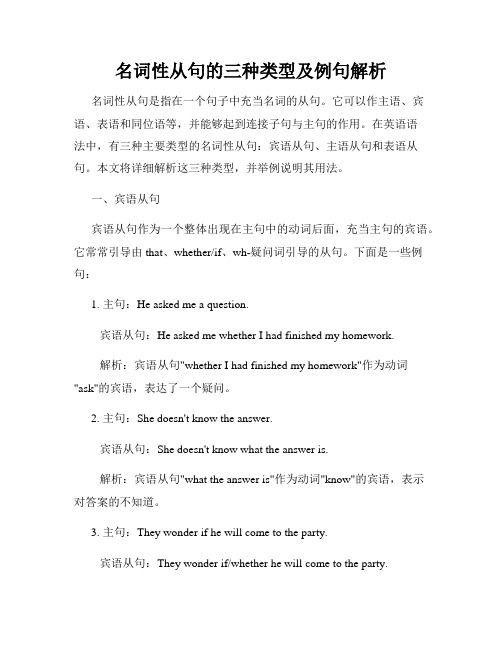
名词性从句的三种类型及例句解析名词性从句是指在一个句子中充当名词的从句。
它可以作主语、宾语、表语和同位语等,并能够起到连接子句与主句的作用。
在英语语法中,有三种主要类型的名词性从句:宾语从句、主语从句和表语从句。
本文将详细解析这三种类型,并举例说明其用法。
一、宾语从句宾语从句作为一个整体出现在主句中的动词后面,充当主句的宾语。
它常常引导由that、whether/if、wh-疑问词引导的从句。
下面是一些例句:1. 主句:He asked me a question.宾语从句:He asked me whether I had finished my homework.解析:宾语从句"whether I had finished my homework"作为动词"ask"的宾语,表达了一个疑问。
2. 主句:She doesn't know the answer.宾语从句:She doesn't know what the answer is.解析:宾语从句"what the answer is"作为动词"know"的宾语,表示对答案的不知道。
3. 主句:They wonder if he will come to the party.宾语从句:They wonder if/whether he will come to the party.解析:宾语从句"if/whether he will come to the party"作为动词"wonder"的宾语,表达了对他是否会来参加派对的疑问。
二、主语从句主语从句作为一个整体出现在句子的最前面,充当主句的主语。
它通常由that引导,也可以由wh-疑问词引导。
以下是一些例句:1. 主句:It is important to learn a foreign language.主语从句:That she is a hardworking student is important.解析:主语从句"That she is a hardworking student"作为句子的主语,强调了她是一个勤奋的学生的重要性。
名词性从句完整版

壹
从出题者的角度,就是要考察名词性从句中的语序以及引导词之间的区别。有时候,会结合插入语或名词与同位语隔开,或使句子结构复杂化等使得难度增加。其实,总的难度和变化都不大。但是从考生的角度来说,如果考生对句子结构掌握不过硬,对某些词或词组的用法不了解,就会容易造成和定语从句、状语从句的混淆,造成根本环节的误判而用其他从句的规则去解题。造成丢分。
04
⒊连接副词:引导从句并作从句的状语 when—表示时间 where—表示地点 why—表示原因 how—表示方式 ①When we’ll have a meeting is not decided. ②I don’t know where I can buy such a book . ③ Why he did it will remain a puzzle forever. ④The question is how we should carry out the plan.
正:It was doubtful if /whether Mary really heard him.
误:If Mary really heard him is really doubtful.
正:Whether Mary really heard him is really doubtful.
eg.Wherever he goes makes his parents worry.
( 主语从句)
1
2
3
4
5
6
注意:
如何选用连接词?
用法规则:
先根据从句的结构确定用哪种连接词,从句
不缺成分用连词,缺主语、宾语、表语、定语用
连接代词,缺状语用连接副词,再根据从句意思
名词性从句
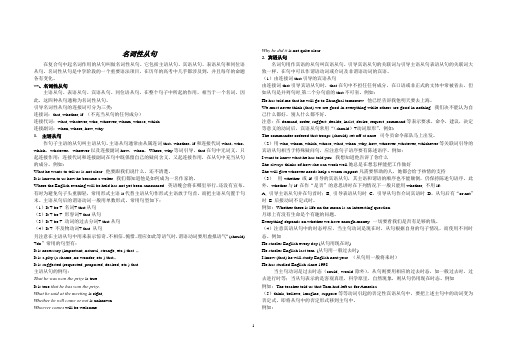
名词性从句在复合句中起名词作用的从句叫做名词性从句。
它包括主语从句、宾语从句、表语从句和同位语从句。
名词性从句是中学阶段的一个重要语法项目,在历年的高考中几乎都涉及到,并且每年的命题各有变化。
一、名词性从句主语从句、表语从句、宾语从句、同位语从句,在整个句子中所起的作用,相当于一个名词。
因此,这四种从句通称为名词性从句。
引导名词性从句的连接词可分为三类:连接词:that, whether, if (不充当从句的任何成分)连接代词:what, whatever, who, whoever, whom, whose, which.连接副词:when, where, how, why1.主语从句作句子主语的从句叫主语从句。
主语从句通常由从属连词that,whether,if和连接代词what,who,which,whatever,whoever以及连接副词how,when,Where, why等词引导。
that在句中无词义,只起连接作用;连接代词和连接副词在句中既保留自己的疑问含义、又起连接作用,在从句中充当从句的成分。
例如:What he wants to tell us is not clear. 他要跟我们说什么,还不清楚。
It is known to us how he became a writer. 我们都知道他是如何成为一名作家的。
Where the English evening will be held has not yet been announced. 英语晚会将在哪里举行,还没有宣布。
有时为避免句子头重脚轻,常用形式主语it代替主语从句作形式主语放于句首,而把主语从句置于句末。
主语从句后的谓语动词一般用单数形式。
常用句型如下:(1)It + be + 名词+ that从句(2)It + be + 形容词+ that从句(3)It + be + 动词的过去分词+ that从句(4)It + 不及物动词+ that 从句另注意在主语从句中用来表示惊奇、不相信、惋惜、理应如此等语气时,谓语动词要用虚拟语气“(should) +do”常用的句型有:It is necessary (important, natural, strange, etc.) that …It is a pity (a shame, no wonder, etc.) that…It is suggested (requested, proposed, desired, etc.) that主语从句的例句:That he was won the prize is true.It is true that he has won the prize.What he said at the meeting is right,Whether he will come or not is unknown.Whoever comes will be welcome. Why he did it is not quite clear.2. 宾语从句名词句用作宾语的从句叫宾语从句。
名词性从句
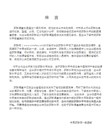
D.引导同位语从句时,切不可错用which。例如:
Word has come that some American guests will come to visit our school next week. 有消息说下周将有一些美国客人来我校参观。
____ you have seen both fighters, ____ will win?
A. Since; do you think who B. As; who you think
C. When; whoever D. Since; who do you think
解析:根据上面的讲解,不难知道答案是D。其中do you think是插入成分,其余部分是宾语从句,作think的宾语;由于引导词在从句中作主语,所以要用主格who(不用whom)。
-I drove to Zhuhai for the air show last week.
-Is that ____ you had a few days off?
A. why B. when C. that D. where
解析:答案是A,why引导的从句作表语,同时why在从句中作原因状语。这里之所以选why,而不是when或 where等,唯一的依据便是句子的逻辑含义,及语境。
whatever,whoever,whichever引导名词性从句
一、基本用法概说英语中的-ever 词主要包括 whatever, whoever, whichever, whenever, wherever, however 等,其中可引导名词性从句的主要有 whatever, whoever, whichever等,其中可引导Roman'; mso-ascii-font-family: 'Times New Roman'">。这里所说的名词性从句主要指主语从句和宾语从句,它们通常不用于引导同位语从句,同时也很少用于引导表语从句。如:Whatever he said was right. 无论他说什么都是对的。(引导主语从句)I don’t believe whatever he said. 无论他说什么我都不信。(引导宾语从句)在某些特定的语境中,也可用于引导表语从句。如:
什么是名词性从句
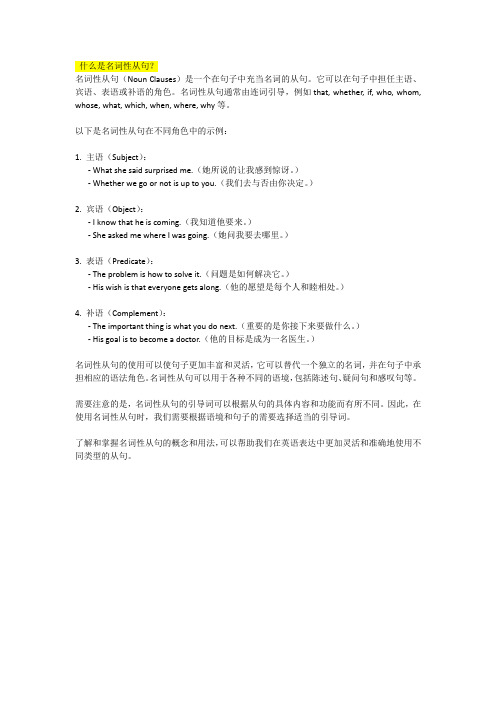
什么是名词性从句?名词性从句(Noun Clauses)是一个在句子中充当名词的从句。
它可以在句子中担任主语、宾语、表语或补语的角色。
名词性从句通常由连词引导,例如that, whether, if, who, whom, whose, what, which, when, where, why等。
以下是名词性从句在不同角色中的示例:1. 主语(Subject):- What she said surprised me.(她所说的让我感到惊讶。
)- Whether we go or not is up to you.(我们去与否由你决定。
)2. 宾语(Object):- I know that he is coming.(我知道他要来。
)- She asked me where I was going.(她问我要去哪里。
)3. 表语(Predicate):- The problem is how to solve it.(问题是如何解决它。
)- His wish is that everyone gets along.(他的愿望是每个人和睦相处。
)4. 补语(Complement):- The important thing is what you do next.(重要的是你接下来要做什么。
)- His goal is to become a doctor.(他的目标是成为一名医生。
)名词性从句的使用可以使句子更加丰富和灵活,它可以替代一个独立的名词,并在句子中承担相应的语法角色。
名词性从句可以用于各种不同的语境,包括陈述句、疑问句和感叹句等。
需要注意的是,名词性从句的引导词可以根据从句的具体内容和功能而有所不同。
因此,在使用名词性从句时,我们需要根据语境和句子的需要选择适当的引导词。
了解和掌握名词性从句的概念和用法,可以帮助我们在英语表达中更加灵活和准确地使用不同类型的从句。
名词性从句有哪些
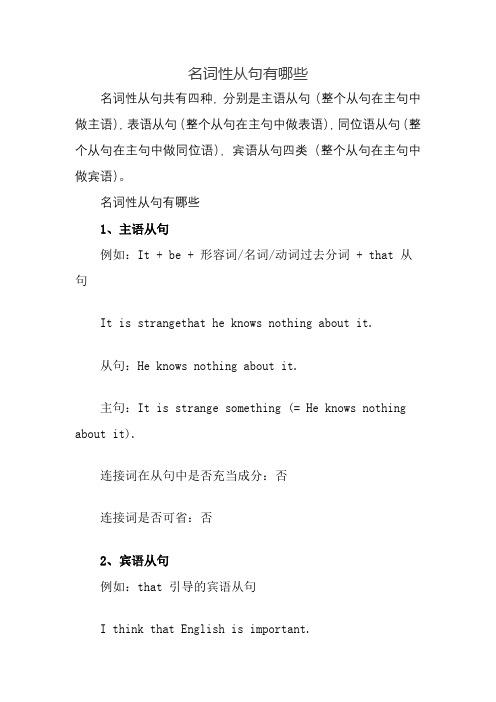
名词性从句有哪些名词性从句共有四种,分别是主语从句(整个从句在主句中做主语),表语从句(整个从句在主句中做表语),同位语从句(整个从句在主句中做同位语),宾语从句四类(整个从句在主句中做宾语)。
名词性从句有哪些1、主语从句例如:It + be + 形容词/名词/动词过去分词 + that 从句It is strangethat he knows nothing about it.从句:He knows nothing about it.主句:It is strange something (= He knows nothing about it).连接词在从句中是否充当成分:否连接词是否可省:否2、宾语从句例如:that 引导的宾语从句I think that English is important.从句:English is important.主句:I think something (= English is important).连接词在从句中是否充当成分:否连接词是否可省:是3、表语从句用法和结构同宾语从句,区别在于:系动词后面所接的从句为表语从句,而及物动词后面所接的从句为宾语从句。
例如:- that 引导的表语从句The truth is that English is important.从句:English is important.主句:The truth is something (= that English is important).4、同位语从句同位语从句就是在复合句中作名词的同位语的名词性从句。
同位语从句对于名词进一步解释,说明名词的具体内容,一般由that引导,同位语从句有时可以不紧跟在它所说明的名词后面,而是被别的词隔开。
名词性从句
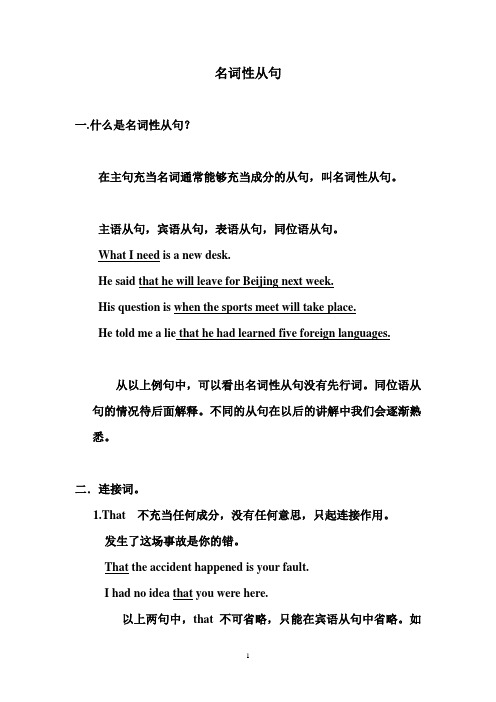
名词性从句一.什么是名词性从句?在主句充当名词通常能够充当成分的从句,叫名词性从句。
主语从句,宾语从句,表语从句,同位语从句。
What I need is a new desk.He said that he will leave for Beijing next week.His question is when the sports meet will take place.He told me a lie that he had learned five foreign languages.从以上例句中,可以看出名词性从句没有先行词。
同位语从句的情况待后面解释。
不同的从句在以后的讲解中我们会逐渐熟悉。
二.连接词。
1.That 不充当任何成分,没有任何意思,只起连接作用。
发生了这场事故是你的错。
That the accident happened is your fault.I had no idea that you were here.以上两句中,that 不可省略,只能在宾语从句中省略。
如果省略的话,句子的意思不清,句子成分也不明。
2.whether, if ( 不做句子成分,有意思,有连接作用)The question is whether the book is worth reading.Whether the pollution can be controlled depends on the effect we will make.以上两句不能用if代替whether.If 只能用于宾语从句,但不能用于介词宾语从句。
He didn’t make sure if (whether)he would take p art in the party.Everything depends on whether we have enough experience.3.连接代词或连接副词(所有疑问代词和疑问副词都可以转为连接代词或连接副词)(做句子成分,有意思,有连接作用。
名词性从句
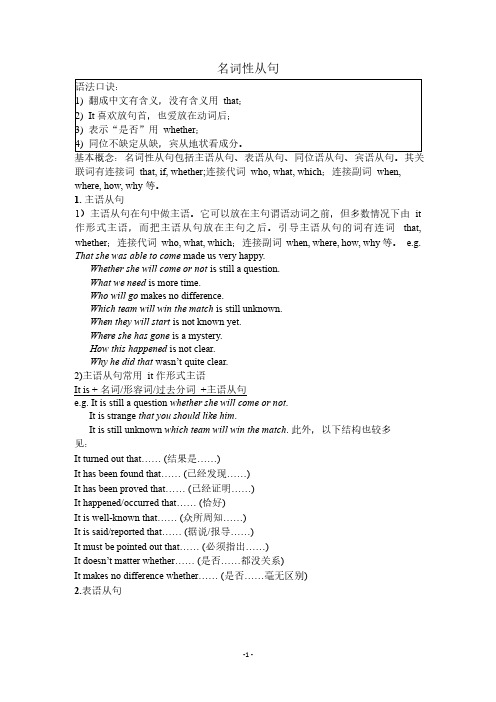
名词性从句联词有连接词that, if, whether;连接代词who, what, which;连接副词when, where, how, why 等。
1. 主语从句1)主语从句在句中做主语。
它可以放在主句谓语动词之前,但多数情况下由it 作形式主语,而把主语从句放在主句之后。
引导主语从句的词有连词that, whether;连接代词who, what, which;连接副词when, where, how, why 等。
e.g. That she was able to come made us very happy.Whether she will come or not is still a question.What we need is more time.Who will go makes no difference.Which team will win the match is still unknown.When they will start is not known yet.Where she has gone is a mystery.How this happened is not clear.Why he did that wasn’t quite clear.2)主语从句常用it 作形式主语It is + 名词/形容词/过去分词+主语从句e.g. It is still a question whether she will come or not.It is strange that you should like him.It is still unknown which team will win the match. 此外,以下结构也较多见:It turned out that…… (结果是……)It has been found that…… (已经发现……)It has been proved that…… (已经证明……)It happened/occurred that…… (恰好)It is well-known that…… (众所周知……)It is said/reported that…… (据说/报导……)It must be pointed out that…… (必须指出……)It doesn’t matter whether…… (是否……都没关系)It makes no difference whether…… (是否……毫无区别)2.表语从句1)表语从句位于系动词之后,由that 引导,起连接作用的that 有时可省略。
名词性从句
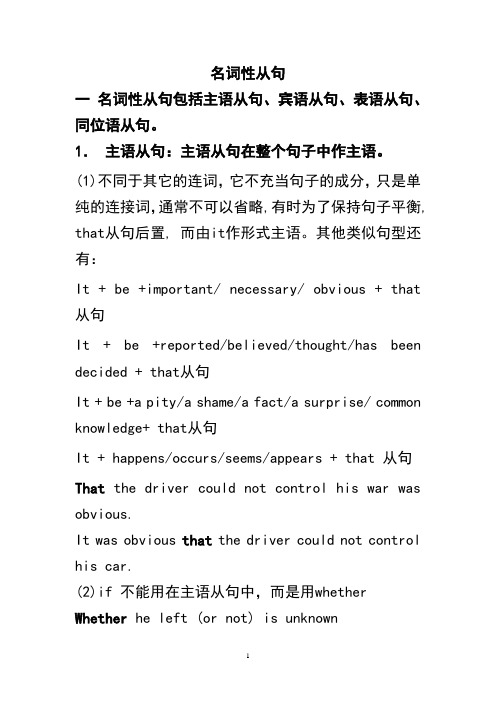
名词性从句一名词性从句包括主语从句、宾语从句、表语从句、同位语从句。
1.主语从句:主语从句在整个句子中作主语。
(1)不同于其它的连词,它不充当句子的成分,只是单纯的连接词,通常不可以省略,有时为了保持句子平衡, that从句后置, 而由it作形式主语。
其他类似句型还有:It + be +important/ necessary/ obvious + that 从句It + be +reported/believed/thought/has been decided + that从句It + be +a pity/a shame/a fact/a surprise/ common knowledge+ that从句It + happens/occurs/seems/appears + that 从句That the driver could not control his war was obvious.It was obvious that the driver could not control his car.(2)if 不能用在主语从句中,而是用whether Whether he left (or not) is unknown(3)当主语从句作主语时,谓语动词一般用第三人称单数What we need is more time and money.What we need are many more books.2.表语从句:表语从句出现在系动词后,充当表语。
其基本结构为: 主语 + 系动词 + that从句。
The trouble is that we are short of money.Go and get your coat. It’s where you left it.3.宾语从句:及物动词,形容词和介词后加宾语从句作其宾语。
(1)宾语从句时态与主句相呼应,但宾语从句表示的是客观真理或普遍现象除外The teacher told us that the earth moves aroundthe sun(2)连词whether和 if可以互换,但注意下列情况连词后紧跟or not时用whether I want to knowwhether or not they will come. 作介词宾语是用whether引导宾语从句He wasinterested in whether he saw her there. 连接词后直接加不定式,不能用if只能用whether Hedoesn’t know whether to stay or not. 如果宾语从句是否定时,一般用if引导I care ifhe will not attend the meeting.(3)当宾语从句后带宾补时,要用“主语+谓语+it +宾补+that-clause,that不可省略I think it certain that she will do well inher exam.(4)当主语是I, we ,主句用think, believe, suppose, expect, imagine五个动词时,用否定转移I don’t think he will win the game, will he?(5)that在宾语从句常可以省略,但由and或 but连接两个或多个宾语从句时,仅可以省略第一个连词that He said (that) he had eaten nothing but that he wasn’t hungry.(6)注意区别if引导的宾语从句和条件状语从句I don’t know if he will come.If he comes, I’ll let you know.注意:beg, insist, desire, command, order, suggest, advise, demand, require, request等动词如果后面加上宾语从句的话, 从句谓语部分必须用should do。
名词性从句
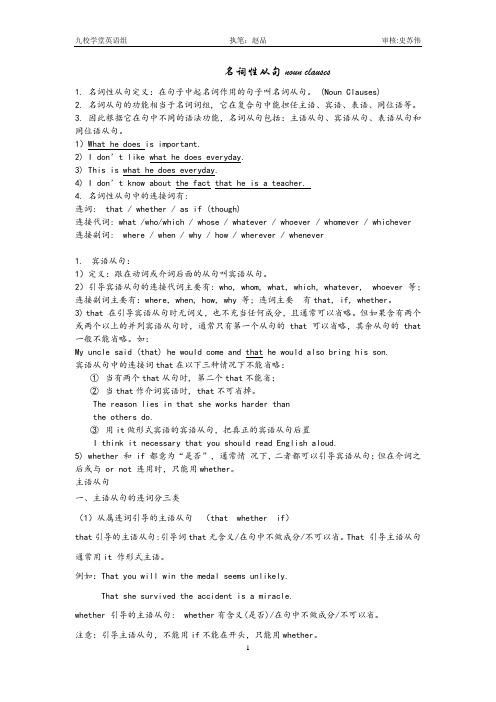
名词性从句noun clauses1. 名词性从句定义:在句子中起名词作用的句子叫名词从句。
(Noun Clauses)2. 名词从句的功能相当于名词词组, 它在复合句中能担任主语、宾语、表语、同位语等。
3. 因此根据它在句中不同的语法功能,名词从句包括:主语从句、宾语从句、表语从句和同位语从句。
1)What he does is important.2) I don’t like what he does everyday.3) This is what he does everyday.4) I don’t know about the fact that he is a teacher.4. 名词性从句中的连接词有:连词: that / whether / as if (though)连接代词: what /who/which / whose / whatever / whoever / whomever / whichever 连接副词: where / when / why / how / wherever / whenever1.宾语从句:1)定义:跟在动词或介词后面的从句叫宾语从句。
2)引导宾语从句的连接代词主要有: who, whom, what, which, whatever, whoever 等;连接副词主要有:where, when, how, why 等; 连词主要有that, if, whether。
3) that 在引导宾语从句时无词义,也不充当任何成分,且通常可以省略。
但如果含有两个或两个以上的并列宾语从句时,通常只有第一个从句的that可以省略,其余从句的that 一般不能省略。
如:My uncle said (that) he would come and that he would also bring his son.宾语从句中的连接词that在以下三种情况下不能省略:①当有两个that从句时, 第二个that不能省;②当that作介词宾语时, that不可省掉。
名词性从句
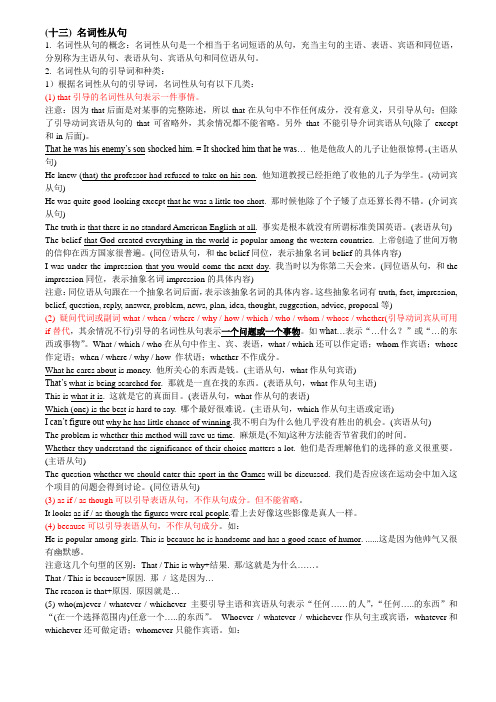
(十三) 名词性从句1. 名词性从句的概念:名词性从句是一个相当于名词短语的从句,充当主句的主语、表语、宾语和同位语,分别称为主语从句、表语从句、宾语从句和同位语从句。
2. 名词性从句的引导词和种类:1)根据名词性从句的引导词,名词性从句有以下几类:(1) that引导的名词性从句表示一件事情。
注意:因为that后面是对某事的完整陈述,所以that在从句中不作任何成分,没有意义,只引导从句;但除了引导动词宾语从句的that可省略外,其余情况都不能省略。
另外that不能引导介词宾语从句(除了except 和in后面)。
That he was his enemy’s son shocked him. = It shocked him that he was… 他是他敌人的儿子让他很惊愕。
(主语从句)He knew (that) the professor had refused to take on his son. 他知道教授已经拒绝了收他的儿子为学生。
(动词宾从句)He was quite good-looking except that he was a little too short. 那时候他除了个子矮了点还算长得不错。
(介词宾从句)The truth is that there is no standard American English at all. 事实是根本就没有所谓标准美国英语。
(表语从句) The belief that God created everything in the world is popular among the western countries. 上帝创造了世间万物的信仰在西方国家很普遍。
(同位语从句,和the belief同位,表示抽象名词belief的具体内容)I was under the impression that you would come the next day. 我当时以为你第二天会来。
什么是名词性从句
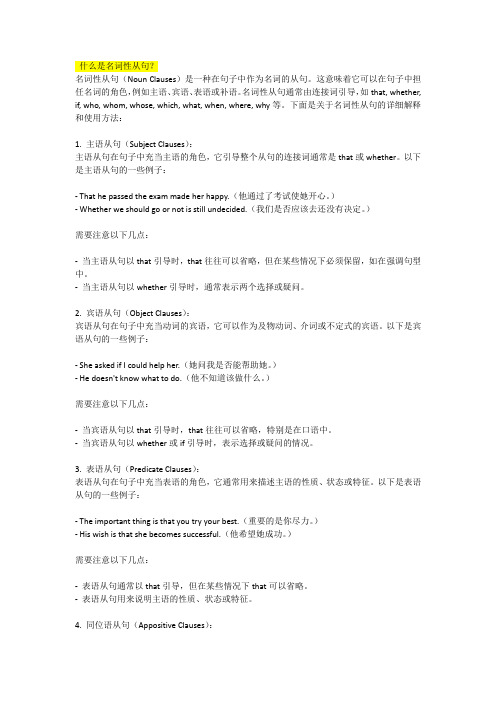
什么是名词性从句?名词性从句(Noun Clauses)是一种在句子中作为名词的从句。
这意味着它可以在句子中担任名词的角色,例如主语、宾语、表语或补语。
名词性从句通常由连接词引导,如that, whether, if, who, whom, whose, which, what, when, where, why等。
下面是关于名词性从句的详细解释和使用方法:1. 主语从句(Subject Clauses):主语从句在句子中充当主语的角色,它引导整个从句的连接词通常是that或whether。
以下是主语从句的一些例子:- That he passed the exam made her happy.(他通过了考试使她开心。
)- Whether we should go or not is still undecided.(我们是否应该去还没有决定。
)需要注意以下几点:-当主语从句以that引导时,that往往可以省略,但在某些情况下必须保留,如在强调句型中。
-当主语从句以whether引导时,通常表示两个选择或疑问。
2. 宾语从句(Object Clauses):宾语从句在句子中充当动词的宾语,它可以作为及物动词、介词或不定式的宾语。
以下是宾语从句的一些例子:- She asked if I could help her.(她问我是否能帮助她。
)- He doesn't know what to do.(他不知道该做什么。
)需要注意以下几点:-当宾语从句以that引导时,that往往可以省略,特别是在口语中。
-当宾语从句以whether或if引导时,表示选择或疑问的情况。
3. 表语从句(Predicate Clauses):表语从句在句子中充当表语的角色,它通常用来描述主语的性质、状态或特征。
以下是表语从句的一些例子:- The important thing is that you try your best.(重要的是你尽力。
(完整版)名词性从句
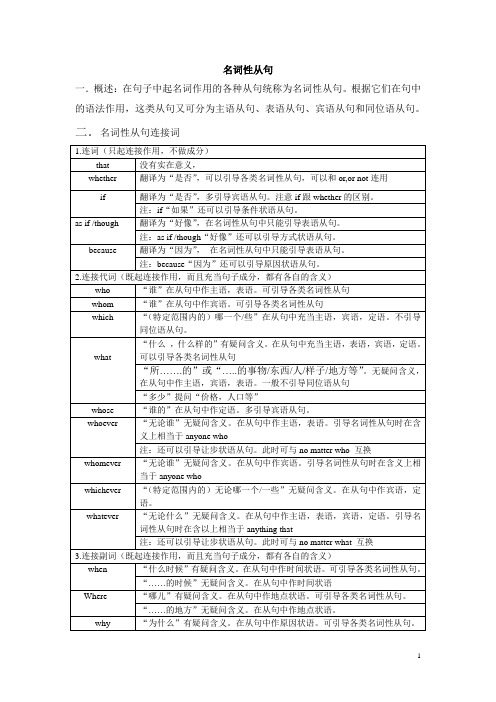
名词性从句一.概述:在句子中起名词作用的各种从句统称为名词性从句。
根据它们在句中的语法作用,这类从句又可分为主语从句、表语从句、宾语从句和同位语从句。
二.名词性从句连接词四.if, whether的区别1.引导主语从句时,如果主语从句放在句首,只能用whether不能用if引导,但是如果用it 做形式主语,而把主语从句放在句末时,也可以用if引导.2.引导宾语从句时常放在动词know, ask, care, wonder之后,if和whether均可。
少数动词,如: leave, put, discuss, doubt后的宾语从句常用whether. 。
3.在介词后面的宾语从句中,在表语从句、同位语从句中,表“是否”,只能用whether;4.whether和if都可以和or not连用,但是whether 之后可以直接跟or not,而if不可以。
I do n’t know whether or not I will stay.(只能用whether)5.在不定式前只能用whether.如:I can’t decide whether to stay. 我不能决定是否留下。
五.与“命令、要求、建议”等相关的名词性从句中通常用虚拟语气,虚拟语气的构成是“should+动词原形”或省去should,直接用动词原形。
六.名词性从句以考查引导词为主,同时考查时态,语序,与其它从句的区别以及混同虚拟语气的考查。
一.主语从句1.主语从句定义:在复合句中充当主语的句子叫做主语从句。
That he will succeed is certain.Whether wild life can be well protected is of great importance.Who will go makes no different.Which kind of food is the best is still not certain.What is needed for the space trip is careful preparation.Whoever comes is welcome.How we can help the twins will be discussed at the meeting.When they’ll start the project has not been decided yet.Where he hid the money is to be found out.Why dinosaurs died out remains a puzzle.2.主语从句引导词按照在句中是否做成分主要分为三类:连词that、whether、if 连接代词、连接副词。
名词性从句
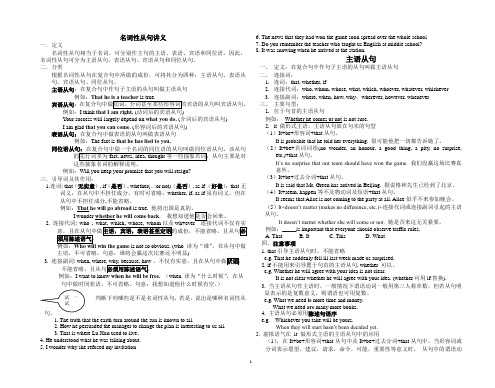
名词性从句讲义一.定义名词性从句相当于名词,可分别作主句的主语、表语、宾语和同位语。
因此,名词性从句可分为主语从句、表语从句、宾语从句和同位从句。
二.分类根据名词性从句在复合句中所做的成份,可将其分为四种:主语从句、表语从句、宾语从句、同位从句。
主语从句:在复合句中作句子主语的从句叫做主语从句 例如:宾语从句: 例如:I think Your success will largely depend on what you do. (介词后的宾语从句) I am glad that you can come . (形容词后的宾语从句) 表语从句:在复合句中做表语的从句叫做表语从句 例如:The fact is that he has lied to you.例如:Will you keep your promise that you will resign? 三.引导词及其作用:1.连词: that (无实意), if (是否), whether(…or not)(是否), as if (好像);that 无词义,在从句中不担任成分,有时可省略;whether, if, as if 虽有词义,但在从句中不担任成分,不能省略。
例如:That he will go abroad is true.I wonder whether he will come back .2. 连接代词: who ,is not so obvious. (who 译为“谁”,在从句中做2. How he persuaded the manager to change the plan is interesting to us all.3. That is where Lu Xun used to live 。
4. He understood what he was talking about.5. I wonder why she refused my invitation6. The news that they had won the game soon spread over the whole school7. Do you remember the teacher who taught us English at middle school?8. It was snowing when he arrived at the station.主语从句一、 定义:在复合句中作句子主语的从句叫做主语从句 二、 连接词:1. 连词:that, whether, if2. 连接代词:who, whom, whose, what, which, whoever, whatever, whichever3. 连接副词:where, when, how, why ,wherever, however, whenever 三、 主要句型:1. 位于句首的主语从句例如: Whether he comes or not is not sure. 2. it 做形式主语,主语从句放在句末的句型 (1)It+be+形容词+that 从句。
- 1、下载文档前请自行甄别文档内容的完整性,平台不提供额外的编辑、内容补充、找答案等附加服务。
- 2、"仅部分预览"的文档,不可在线预览部分如存在完整性等问题,可反馈申请退款(可完整预览的文档不适用该条件!)。
- 3、如文档侵犯您的权益,请联系客服反馈,我们会尽快为您处理(人工客服工作时间:9:00-18:30)。
同位语从句(The Appositive Clause)
1.同位语从句在句中作同位语,它一般要放在主句中某些名词的后面,说明这些名词的含义。可跟同位语从句的名词主要有fact, news, promise, reason, idea等。如:
We heard the news that our team had won.
4.whether和if引导的宾语从句可以互换使用,但介词后的宾语从句只能用whether, 不能用if。如:
He asked me if (whether) my brother was at home.
It is a question of whether we should go.
3)当that从句是双宾语中的直接宾语时,thar tell anyone that I could not see the cloth.
4)当that宾语从句前有it作形式宾语时,that 不可省。如:
We think it important that we study hard.
3. 当先行词被序数词或形容词最高级修饰时。如:
This is the best film that I have ever seen.
4. 当出现两个或两个以上的先行词,并同时兼指人和物时。如:
We are talking about the people and countries that we have visited.
宾语从句(The Object Clause)
1.宾语从句在句中作及物动词或介词的宾语。如:
I wonder who he is.
He is sorry for what he has done.
注:在口语及非正式文体中,that常省略。
2.使用宾语从句时应注意时态呼应。
1) 主句谓语动词是现在时或将来时,从句谓语动词可以用任何所需要的时态。如:
主语从句(The Subject Clause)
1.主语从句在句中作主语。如:
Which team will win the match is still not certain.
Why he did that wasn’t quite clear.
2.主语从句位于句首时,会使句子显得笨重,因此常以it 作为形式主语,而将主语从句后置,以保持句子平衡。如:
定语从句和状语从句
(Attributive Clauses and Adverbial Clauses)
定语从句
定语从句也称为关系从句或形容词性从句,由关系代词(who, whom, whose, which, that)或关系副词(as, when, where, why)等引导。关系词除了起引导作用外,还在从句中指代前面的先行词,并在从句中担任一定的成分。如:
It is doubtful whether/if the President knew the details of the plan. 总统是否知道这个计划的细节这一点颇有疑问。
表语从句(The Predicative Clause)
1.表语从句在句中作表语,位于主句中的系动词之后。如:
5. 当主句是以which 或 who 开头的特殊疑问句时。如:
Who is the person that is standing over there?
6. 当定语从句为there be 句型时,关系代词只能用that,但经常可以省略。如:
I know the difference (that) there is between you.
He spoke confidently, which impressed me most. (which指代整个主句,在从句中作主语)
2. as引导的非限定性定语从句既可以放在主句之前,也可以放在主句之后,但which或who引导的非限定性定语从句不能放在主句之前。如:
As we all know, the moon is a satellite of the earth.
I have no idea how soon they are coming.
2.同位语从句与定语从句的主要区别:
从意义上来说,同位语从句对一个名词加以补充说明,定语从句对一个名词进行修饰或限定。从结构上说,同位语从句由连词引导,连词在句中不作任何成分,只起引导作用;引导定语从句的关系代词在从句中担任一定成分,含有代替所修饰或限制词语的意义。如:
五、名词性从句、状语从句及定语从句
(Clauses Functioning as Noun Phrases,Attributive Clauses and Adverbial Clauses)
名词性从句的功能相当于名词词组。按其句法功能,名词性从句可分为主语从句、表语从句、宾语从句和同位语从句。引导名词性从句的有连接词that, whether 和if,关系代词who, whom, whose, what, which, whatever, whichever, whoever以及关系副词when, where和how。
The question is whether she can speak English.
That is what we need.
2.表语从句可用whether引导,也可用as if 引导,但不能用if 引导。如:
His first question was whether Tom had arrived yet.
I’m sure that you’ll succeed.
2) 主句谓语动词是过去时态,从句谓语动词一般须用过去时。如:
I thought he studied hard.
3) 从句如果与某一具体的过去时间状语连用,尽管其谓语动作发生在主句谓语动作之前,仍用一般过去时。如:
She told me that her father died in 1991.
They were all shocked at the news that Germany had declared war on Russia. 他们都为德国向俄国宣战而感到震惊。(同位语从句,that只起引导作用,在句中不作任何成分。)
They were all shocked at the news that was announced on the radio. 他们都为收音机中宣布的消息而震惊。(定语从句,that在从句中作主语,若省略that,句子成分不全。)
It looked as if it was going to rain.
3.主句的主语是reason时,表语从句要用that,不能用because。如:
The reason why he was dismissed was that he was careless and irresponsible. 他被开除的原因是他工作马虎,不负责任。
All that you want are here.
2. 当先行词被all, no, some, any, every, a few, a little, much, only, very等修饰时。如:
There is no person that doesn’t make mistakes.
My brother, who works abroad, is coming next week. 我哥哥在国外工作,他下周将回来。(非限定性定语从句)
注:1. 非限定性定语从句不能用that来引导,一般用which,as或who(指人)。用which或as引导时,既可以修饰主句的部分内容,也可修饰主句的全部内容。如:
The car which was stolen has been found.(which 指代先行词car,在从句中作主语)
The house whose windows are broken is empty. (whose 是所有格,在从句中作定语)
I shall never forget the day when I entered the university. (when指代先行词day,在从句中作时间状语)
He said (that) he couldn’t tell you right away and that you wouldn’t understand.
2)当主句的谓语动词与that宾语从句之间有插入语时,that一般不可省。如:
Just then I noticed, for the first time, that our master was wearing his fine green coat and his black silk cap.
The large area is covered with thick snow, which affects people's life greatly.
3. 在限定性定语从句中,关系代词作宾语时可以省略;但在非限定性定语从句中,关系代词作宾语时不能省略。如:
The film (which) I saw last night is about a young teacher. (which可以省去)
7. 当关系代词在从句中作表语时,常用that。如:
He does not seem to be the man that he was. 他似乎和过去不一样了。
三、as 与其他词连用引导的定语从句
as 引导定语从句时,可指人也可指物,通常与the same,such,so等连用,形式为:the same… as,such… as,as …as,so… as。As在定语从句中可作主语、宾语、表语等。如:
